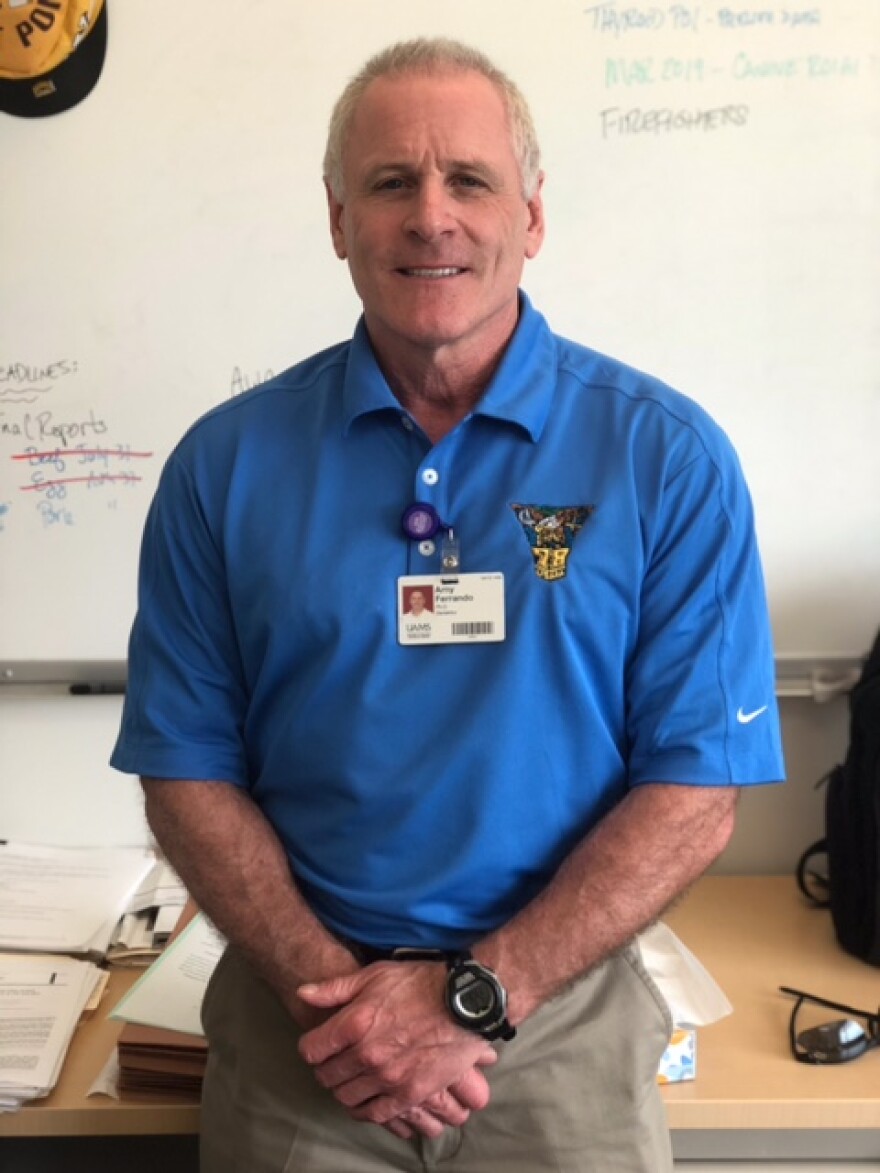University of Arkansas for Medical Sciences researcher Dr. Arny Ferrando has received a $2.1 million grant from the Department of Defense for a program to determine the best possible nutrition for meals given to military personnel engaged in combat or in combat training.
Ferrando will lead the five-year program, which will start with a study about what's best, nutritionally, for the soldiers. Their meals and supplements have to be fast to pack, prepare and eat.
DR. ARNY FERRANDO: The first step is to actually to determine the metabolic requirement for soliders in this environment. We've done some work in the past and it gives us a general idea. But the first project or two will actually look at some pretty elaborate methods and determine what is it, exactly, that the soldiers need in terms of their muscle and maintaining their muscle during these types of stressors.

ANN KENDA: How are the combat soldiers' nutritional needs different from other populations?
DR. FERRANDO: Well, as you can imagine, a soldier in combat-type training, or combat, has a tremendous caloric expenditure. But that's not the easy answer. In other words, just feeding him calories is not the easy answer. There are a number of variables in that equation. There are a lot of stressors that they are faced with, as you can only imagine. Lack of sleep, environmental factors. And by the way, they're getting shot at. They may be cold, they may be wet, etc, etc. So there's a very high requirement for providing the body with what it needs for optimal performance. And what often happens, and this is kind of how we got involved, is the military is pretty good at delivering food. But the problem is, the food they have prepared for them is cumbersome in these environments. Like a Meal Ready to Eat is basically good food components. It's just that it takes some prepartion time and then, by the way, you have to stop to eat it. So most of the time the soldiers engaged in combat operations or combat don't have the time to do that. So they shove whatever they can, whereever they can and eat on the go. So with that format in mind we're kind of looking to optimize, either revamping some sort of package for these soldiers or some sort of supplement for these soldiers, that will help them maintain between periods until they can actually sit down and eat the way the military intended them to.
KENDA: And even under combat circumstances, is it important for the soldiers to receive meals that are appetizing, that they actually want to eat?
DR. FERRANDO: Well, I think that's kind of a loaded question there. I think it's like anything else, if it's palatable, this person — whether it's a soldier or a patient — is more likely to eat it. So yeah, there's some importance to it but the other side of it too is that there comes a time, I can speak from personal experience, when you're hungry enough and tired enough and needy enough that you'll basically take in any sustinence that you can. I think there's two edges to that sword, but more importantly, we're interested in delivering what they optimally need to keep their performance at a high level, and then we can decide on what's the best way to delver that.
KENDA: Could this research benefit other populations in emergency circumstances, such as the firefighters who are battling the California wildfires?
DR. FERRANDO: Yes ma'am, absolutely. That is the whole point of this. My background is actually studying the stressed populations. I actually started off, many years ago, in a burn unit, and doing a lot of ICU work. So the foundation for a lot of this knowledge came from that population. This is a very unique opportunity. Like the firefighters would be, for example. Where you have an inherently healthy individual, in other words, there's no disease or pathology that you're worried about, but you stress them to the limits. And so that gives us a very unique opportunity. And once you determine what would work well in that population, I think you could easily translate that. We've done that in the past with other nutritional and pharmacological interventions.
In the fourth and fifth year of the programs, it'll be tested by participants who are training for combat operations to make sure that it meets their needs and works for them. After that, it'll move to implementation in soldiers' daily regimins.
This story is produced by Arkansas Public Media. What's that? APM is a nonprofit journalism project for all of Arkansas and a collaboration among public media in the state. We're funded in part through a grant from the Corporation for Public Broadcasting, with the support of partner stations KUAR, KUAF, KASU and KTXK. And, we hope, from you!





